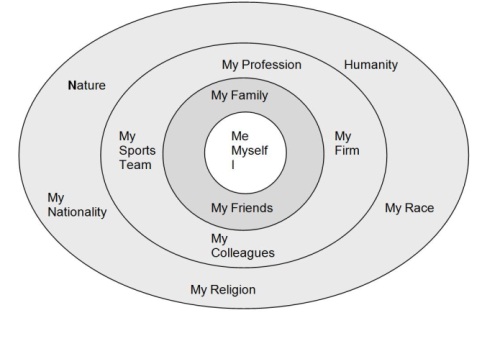In the final article on the FACTS coaching model we look at ‘S’ for ‘Systems Thinking’.
Finally, we reach the ‘S’ of the FACTS approach which represents ‘Systems Thinking’; a skill very different to any of those we have discussed in the model so far. ‘Systems Thinking’ is about the awareness of the ‘bigger picture’ and a willingness of the coach to help the coachee explore this.
When you sit with a coachee, it can sometimes be tempting to think that they are an ‘island’ and that their actions are independent of what is happening in the rest of the organisation and in society as a whole. This way of thinking can lead to a focus upon maximising their performance irrespective of the environment in which they are operating, optimising their behaviour without regard to the impact on their team or peers. Within the FACTS approach we place a much greater emphasis on considering the implications of actions and impacts on the wider organisation and beyond.
Reading the signs
When the bank traders were at work in the ‘boom’ years, their goal was often to maximise their own personal bonuses irrespective of the wider consequences of their actions. There were many high profile cases of traders that took this approach to the limit and took risks that jeopardised the viability of the entire organisation. The warning signs were there many years before the ‘credit crunch’ that suggested that the actions of one individual could generate both ‘desirable results’ but also ‘unintended consequences’ in other parts of the banking system. There had already been well documented cases of rogue traders, like Nick Leeson, bringing banks to their knees through their isolated actions (Leeson, 1997).
As the habit of this behaviour spread in the early 21st century, it was ultimately the collation of all these ‘unintended consequences’ which led to a breakdown of trust in the whole banking system. In a sense no one person was responsible for this ‘crunch’ but, in another sense, all participants in the system were equally responsible. Whilst systems thinking is a discipline that has existed for many years and was brought into the mainstream of business thinking via books like ‘The Learning Organisation’ in the nineties (Senge, 2006), it seems that systems thinking is still regarded as an academic concept and not a principle by which people should live their lives.
The chaos theory
Whenever we coach in a corporate context, we become an active part of that wider organisational system. It is one thing for us to be confidential, independent and detached but does this mean that we can ignore the wider impacts of our work? In chaos theory, there is a famous example of how a butterfly flapping its wings in South America could be the cause of a tornado in Japan due to the complex inter-related global system that is our weather (Lorenz, 1995). How do you know when you are coaching that you might not also be such a ‘butterfly’ and the ‘flapping of your coaching wings’ may shift the energy in the system in such a way that significant impacts arise from your interventions?
If you accept this principle of systems thinking and the idea that actions taken in one part of a system will introduce both ‘desired results’ and also ‘unintended consequences’ then, as a coach, it raises the question of how you fulfil your responsibility to the system as well as your responsibility to the individual and to yourself. It asks you to balance these interests and perspectives proactively rather than to blindly focus upon the individual in a style that may collude with an ‘island mentality’.
One reaction to this dilemma is for coaches to slip into judgement around ‘what the system wants’ – to believe that they know the ‘big answers’ to the ‘big questions’ and to think that their role is to impose this worldview onto the coachee regardless of the coachee’s own values and perspectives. An example would be a coach who is passionate about the environment and who allows this passion to show up in their coaching in a way that uses a subtle ‘guilt-trip’ to manipulate a coachee’s outlook and actions.
Such an approach risks treading on a slippery slope that, at best, leads the coach into a mentoring role or, at worst, stigmatises them as evangelical change agents who will alienate as many coachees as they attract. Neither stance feels like it ought to be the future path of a mature coaching profession.
The ‘third way’
Faced with the options of doing nothing or stepping into judgement, the FACTS approach introduces a ‘third way’ – the practice of using powerful, systems thinking questions to raise the coachee’s self awareness around the wider implications of their thinking and behaviour. Such questions are designed to broaden the coachee’s sphere of responsibility. Whilst they are most definitely leading questions, they do not assume that the coach knows the ‘right answer’ but they do challenge the coachee to expand their thinking.
The figure below, originally developed by Sir John Whitmore (Whitmore, ‘Make a Difference Now’ ICF keynote presentation, 2008), shows the intended impact of systems thinking questions. At the centre of a person’s identity is themselves, the ‘me’ on which they have naturally learnt to focus through the course of ‘day to day’ life. People with this focus are viewed as ‘looking after No.1’ and, in western society, this is a well established cultural norm.

The diagram above gives us a ‘map’ of possible perspectives from which to ask powerful, systems thinking questions. Such questions prompt the coachee to shift their level of thinking and look at the issue from a broader perspective. For example, you might be working with a coachee on the topic of their personal work/life balance. Questions that ask the coachee to consider the perspective of their family as well as their boss on such a topic are already bringing into play different stakeholders in the system.
You might be working with a coachee on a sensitive decision which involves a trade-off between profit and people. A simple question such as: “If your decision were to be featured tomorrow on the front page of ‘The Daily Telegraph’ how would you feel about that?”, confronts the coachee to bring in the perspective of the general public, their friends, their family and so could shift their focus to many different levels of the system.
Finally, you may be working with a finance trader in the next ‘boom’ period who is focussed upon maximising their bonus payment by taking risks, the implications of which they do not fully understand. You might ask such a coachee “If you were talking to your grandchildren in twenty year’s time about this decision, how would you explain it to them?” Such a question may ‘jolt’ the coachees thinking in a way that generates a healthy recognition of their wider role and identity beyond the workplace.
In the FACTS approach, we encourage coaches to create powerful questions that invite the coachee to explore the systems impact of their thinking from different stakeholder perspectives such as customers, staff, shareholders, society, family and friends.
The purpose of the FACTS approach is to raise the coaching profession’s own awareness of its role in the wider system and invite coaches to take responsibility for this without compromising the non-judgemental stance of the coaching philosophy. You could view it as the coaching profession’s contribution to the sustainability agenda!
For more background on the philosophy of the FACTS approach and its link to the question read the other articles:
This article contains extracts from John Blakey and Ian Day’s recently published book ‘Where were all the coaches when the banks went down?’ which is available to order via Amazon. John can be contacted via info@121partners.com .
In the final article on the FACTS coaching model we look at 'S' for 'Systems Thinking'.
Finally, we reach the ‘S’ of the FACTS approach which represents ‘Systems Thinking’; a skill very different to any of those we have discussed in the model so far. ‘Systems Thinking’ is about the awareness of the ‘bigger picture’ and a willingness of the coach to help the coachee explore this.
When you sit with a coachee, it can sometimes be tempting to think that they are an ‘island’ and that their actions are independent of what is happening in the rest of the organisation and in society as a whole. This way of thinking can lead to a focus upon maximising their performance irrespective of the environment in which they are operating, optimising their behaviour without regard to the impact on their team or peers. Within the FACTS approach we place a much greater emphasis on considering the implications of actions and impacts on the wider organisation and beyond.
Reading the signs
When the bank traders were at work in the ‘boom’ years, their goal was often to maximise their own personal bonuses irrespective of the wider consequences of their actions. There were many high profile cases of traders that took this approach to the limit and took risks that jeopardised the viability of the entire organisation. The warning signs were there many years before the ‘credit crunch’ that suggested that the actions of one individual could generate both ‘desirable results’ but also ‘unintended consequences’ in other parts of the banking system. There had already been well documented cases of rogue traders, like Nick Leeson, bringing banks to their knees through their isolated actions (Leeson, 1997).
As the habit of this behaviour spread in the early 21st century, it was ultimately the collation of all these ‘unintended consequences’ which led to a breakdown of trust in the whole banking system. In a sense no one person was responsible for this ‘crunch’ but, in another sense, all participants in the system were equally responsible. Whilst systems thinking is a discipline that has existed for many years and was brought into the mainstream of business thinking via books like ‘The Learning Organisation’ in the nineties (Senge, 2006), it seems that systems thinking is still regarded as an academic concept and not a principle by which people should live their lives.
The chaos theory
Whenever we coach in a corporate context, we become an active part of that wider organisational system. It is one thing for us to be confidential, independent and detached but does this mean that we can ignore the wider impacts of our work? In chaos theory, there is a famous example of how a butterfly flapping its wings in South America could be the cause of a tornado in Japan due to the complex inter-related global system that is our weather (Lorenz, 1995). How do you know when you are coaching that you might not also be such a ‘butterfly’ and the ‘flapping of your coaching wings’ may shift the energy in the system in such a way that significant impacts arise from your interventions?
If you accept this principle of systems thinking and the idea that actions taken in one part of a system will introduce both ‘desired results’ and also ‘unintended consequences’ then, as a coach, it raises the question of how you fulfil your responsibility to the system as well as your responsibility to the individual and to yourself. It asks you to balance these interests and perspectives proactively rather than to blindly focus upon the individual in a style that may collude with an ‘island mentality’.
One reaction to this dilemma is for coaches to slip into judgement around ‘what the system wants’ - to believe that they know the ‘big answers’ to the ‘big questions’ and to think that their role is to impose this worldview onto the coachee regardless of the coachee's own values and perspectives. An example would be a coach who is passionate about the environment and who allows this passion to show up in their coaching in a way that uses a subtle ‘guilt-trip’ to manipulate a coachee's outlook and actions.
Such an approach risks treading on a slippery slope that, at best, leads the coach into a mentoring role or, at worst, stigmatises them as evangelical change agents who will alienate as many coachees as they attract. Neither stance feels like it ought to be the future path of a mature coaching profession.
The 'third way'
Faced with the options of doing nothing or stepping into judgement, the FACTS approach introduces a ‘third way’ – the practice of using powerful, systems thinking questions to raise the coachee's self awareness around the wider implications of their thinking and behaviour. Such questions are designed to broaden the coachee's sphere of responsibility. Whilst they are most definitely leading questions, they do not assume that the coach knows the ‘right answer’ but they do challenge the coachee to expand their thinking.
The figure below, originally developed by Sir John Whitmore (Whitmore, ‘Make a Difference Now’ ICF keynote presentation, 2008), shows the intended impact of systems thinking questions. At the centre of a person's identity is themselves, the ‘me’ on which they have naturally learnt to focus through the course of ‘day to day’ life. People with this focus are viewed as ‘looking after No.1’ and, in western society, this is a well established cultural norm.

The diagram above gives us a ‘map’ of possible perspectives from which to ask powerful, systems thinking questions. Such questions prompt the coachee to shift their level of thinking and look at the issue from a broader perspective. For example, you might be working with a coachee on the topic of their personal work/life balance. Questions that ask the coachee to consider the perspective of their family as well as their boss on such a topic are already bringing into play different stakeholders in the system.
You might be working with a coachee on a sensitive decision which involves a trade-off between profit and people. A simple question such as: “If your decision were to be featured tomorrow on the front page of ‘The Daily Telegraph’ how would you feel about that?”, confronts the coachee to bring in the perspective of the general public, their friends, their family and so could shift their focus to many different levels of the system.
Finally, you may be working with a finance trader in the next ‘boom’ period who is focussed upon maximising their bonus payment by taking risks, the implications of which they do not fully understand. You might ask such a coachee “If you were talking to your grandchildren in twenty year's time about this decision, how would you explain it to them?” Such a question may ‘jolt’ the coachees thinking in a way that generates a healthy recognition of their wider role and identity beyond the workplace.
In the FACTS approach, we encourage coaches to create powerful questions that invite the coachee to explore the systems impact of their thinking from different stakeholder perspectives such as customers, staff, shareholders, society, family and friends.
The purpose of the FACTS approach is to raise the coaching profession's own awareness of its role in the wider system and invite coaches to take responsibility for this without compromising the non-judgemental stance of the coaching philosophy. You could view it as the coaching profession's contribution to the sustainability agenda!
For more background on the philosophy of the FACTS approach and its link to the question read the other articles:
This article contains extracts from John Blakey and Ian Day's recently published book 'Where were all the coaches when the banks went down?' which is available to order via Amazon. John can be contacted via info@121partners.com .





